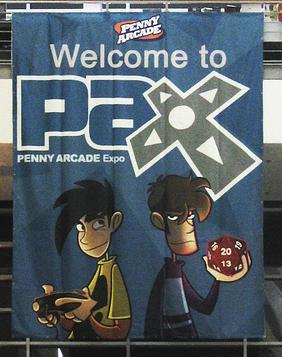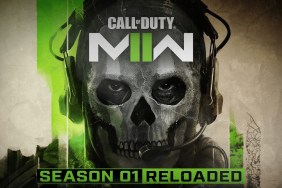Part One: “PAX 10” Indie Showcase Highlights the Favorites
The Penny Arcade Expo in Seattle received nearly 60,000 attendees this weekend from every corner of the gaming community, from hardcore tournament competitors to tabletop role-players and industry wannabes.
For this year’s show, Penny Arcade founders Mike Krahulik and Jerry Holkins stole a page from the 2008 Game Developers Conference in San Francisco, spreading a bit of the independent love around Seattle.
The PAX 10 hand-picks ten indie games, as scored by the PA crew, that are selected to display with the big-boy studios on the exhibition hall floor. Some of these games are released, some are corporate, and some represent student or individual efforts, but all of them received the praise and support of the PAX judges. Krahulik felt he could not do justice to the importance of the showcase, calling it an essential part of future Penny Arcade Expos.
So here's the lowdown on each game, in alphabetical order:
The Amazing Brain Train (PC)
Puzzle/Strategy by Grubby Games
The Amazing Brain Train collects 15 puzzle games into a mash-up of Brain Age-style exercises and the cutesy casual style of Peggle. It’s not the epic game of your dreams but there’s a lot to like, including the consistent, colorful 3D artwork, a graded examination mode, collectible achievements and a nonlinear quest mode. Amazing Brain Train is an impressive effort, looking great for children with potential for older or more hardcore gamers.
Play the Amazing Brain Train Demo! (free download)
Audiosurf (PC)
Rhythm/Racer by Dylan Fitterer, Elizabeth Fitterer, Paladin 3D, Pedro Camacho, Albert Park & Flynn Joffray
Audiosurf is an “adaptive puzzle racer” that turns the Britney Spears songs you’re hiding on your computer into awesome little roller coaster rides. (Don’t worry, we won’t tell anyone.) You collect and match power-ups at speeds upwards of 128 beats per minute as the course rises and falls to the tempo of the music. A dozen playable characters and global leaderboards may inspire you to dust off the more eccentric songs in your collection.
Play Audiosurf! ($10, free Steam ID and service download).
Chronotron (PC)
Action/Puzzle by Scarybug Games
Representing the web games crowd, Chronotron is invading your computers at home and at work, and it’s sending you back in time! Forty brain-busting puzzles challenge you to record actions and then go back in time to team up with your past-selves. It’s harder to explain than a flying DeLorean, plus it has some pretty sweet music so be sure to check it out for yourself.
Play Chronotron! (Or click here to play it with achievements, free log-in.)
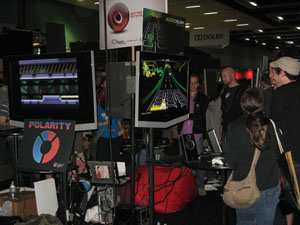 Impulse (PC)
Impulse (PC)
Puzzle by Team Xplosion, Rochester Institute of Technology
A New York-based team of students won tickets to PAX with their inspired puzzler, where players steer a disc around space using the indirect influences of magnets and explosives. Black holes and other obstacles line the particle-heavy road to victory. Impulse was programmed in XNA as part of a 2D Game Development course.
See the Impulse Gameplay Trailer!
The Maw (XBLA)
Action/Adventure by Twisted Pixel Games
Mixing a bit of Katamari Damacy and Nintendo’s Kirby games, The Maw is coming to devour everything you know and love. The developers of NBA Ballers: The Chosen One and Blitz: The League II are going above and beyond with this lush platformer, where you’ll guide the toothy blob-creature through a buffet of extraterrestrial monsters. The Maw and friends have some awesome animations, and every time the bright colors and rounded shapes start to feel too kiddie, your pet Maw flashes its jagged teeth and gobbles down another smiling item on the food chain. With luck, The Maw will arrive before the end of 2008.
Polarity (PC)
Action/Puzzle by Howard Braham, Daniel Bryner, Przemyuslaw Iwanowski, Stanely Rosenbaum, Gaurav Shrivistava, Samuel Spiro and Allison Theus, Carnegie Mellon Univesity
Looking a little like Jetpack or Lode Runner, Polarity is a puzzle-solving platformer game featuring a two-way magnetic suit. Your red outfit attracts blue objects and repels red ones, and can be switched to a blue outfit that attracts red objects and repels blue ones. Soon enough you’re flying around rooms and fighting bosses by twisting these simple, inventive rules. Mike and Jerry of Penny Arcade fame specifically called Polarity a favorite of the show.
Play the Polarity Demo! (free download required)
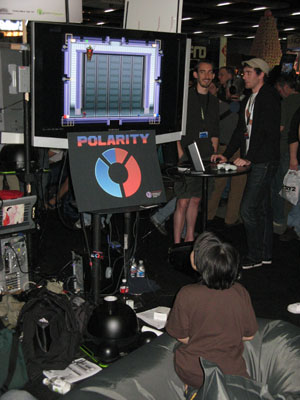 Project Aftermath (PC)
Project Aftermath (PC)
Action/Tactics by Games Faction
Three-dimensional RTS games are a huge undertaking, but the three individuals behind Project Aftermath made a great splash at PAX 2008. The futuristic space war avoids the usual resource-gathering micromanagement, instead focusing on a handful of commander heroes and their squads. Aftermath has some rocking 2D and 3D art and is currently due for a 2008 release.
See the Project Aftermath Trailer!
Schizoid (XBLA)
Action by Torpex Games
“The most co-op game ever” was launched on July 9. Schizoid plays a little like Pac-Man and Asteroids on a devil’s bargain. Each player controls either a blue or a red ship, and each ship can destroy enemies of the opposite color. It’s up to the players to remove each other’s enemies as they clear the maze. Schizoid packs extra features like an AI-assist single-player mode and a one-player-two-ships “Uberschizoid” mode. However, it received mixed reviews from the critics.
Visit the Schizoid Web Site!
Strange Attractors 2 (PC)
Puzzle by Ominous Development, LLC
The third physics-based game to fly the PAX 10 flag is a simple mouse-based puzzler that almost looks like a pinball game. To collect power-ups and clear goals in Strange Attractors 2, players either activate a gravity field that launches their disc toward the nearest platform, or they can activate an anti-gravity field that repels them from every major object.
Play the Strange Attractors 2 Demo! (free download)
Sushi Bar Samurai (PC)
Puzzle by Molly Rocket
“When a baking incident disturbs the traditionally balanced diet of the spirit world…” No, really. Sushi Bar Samurai is a 3D culinary adventure game that’s set on nourishing the soul. Samurai is all about meeting various spirits in limbo, then serving them sushi that sets their souls to rest. If you’re into either Japanese food or ghost-busting then this one has your number, and it’s all due to three or four years of hard work by designer-artist-engineer-creator Casey Muratori. Sushi Bar Samurai is scheduled for Spring 2009.
Visit the Sushi Bar Samurai Web Site!
There’ll be more PAX reactions to come, readers, so thanks for looking and see you soon!
Weekend Warriors
The Penny Arcade Expo hosts commercial game demonstrations, cosplay parades, and game-centric concerts for three days in Downtown Seattle, because hey, it’s a show about gamers. Tens of thousands of people sequester themselves in conference rooms and hotel suites with armfuls of electronics and board games, for a self-destructive week of gaming until 3 a.m the break of dawn you remember to pee.
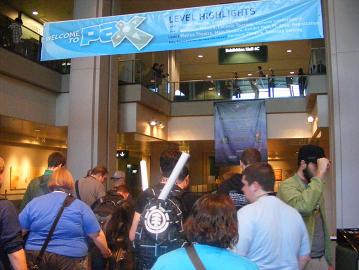 Some of these attendees will sink into plastic chairs or comfy beanbags for three days of R&R, but some aspire to perform at a higher level. They migrate from all over the globe to compete in favorites like Halo, Guitar Hero, and Super Smash Bros. Why be anonymous in the age of broadband connections and voice chat?
Some of these attendees will sink into plastic chairs or comfy beanbags for three days of R&R, but some aspire to perform at a higher level. They migrate from all over the globe to compete in favorites like Halo, Guitar Hero, and Super Smash Bros. Why be anonymous in the age of broadband connections and voice chat?
The Omegathon is Penny Arcade’s answer to the video game tournament, an Olympic-style gauntlet that teeters between nostalgic reverence and self-parody. Twenty random PAX attendees are chosen to compete and branded with matching “Omeganaut” T-shirts. Their prize for surviving the six-round throw-down is two tickets to Tokyo Game Show and $5,000 pocket change to boot.
It’s hard to imagine a game of Jenga drawing a huge crowd, but tournaments like the Omegathon dig up some fierce competition between total strangers and the people around them. It makes for an epic, slightly more magical weekend, as experienced by gamers like you, me, and 30-year-old Brian Jo of San Francisco.
The Call to PAX
When Game Revolution last visited Brian “Pikachoochoo” Jo, he was stepping onto an Amtrak train en route to Seattle. Jo should rest up on the 24-hour train ride, but he won’t. The West Coast Starlight route is overrun with gamers who hijack the train’s TVs and tables for endless gab and play. And Jo will join in, as if he hasn’t already played enough in preparation for PAX.
Jo was already planning to go to PAX with half a dozen close friends with a little Halo and Rock Band practice. On a Bay Area beach, a month before the show, a sudden phone call from friend Andy Lispke cast his lackadaisically geeky plans aside.
Lispke was cruising the Penny Arcade forums when he spotted a contest between the trolls and diatribes. One of the 20 Omegathon competitors could not attend PAX, and the PA community had an hour to win the open spot. The name of the game was “Pick A Number From One To A Million”, and Andy was rounding up friends to pool their entries and play the odds.
With a little calculus, some Price is Right strategizing, and a heap of luck, Jo’s number 498,123 won him the last seat in the Omegathon. His friends soon rallied around their new “star” athlete, printing Brian Jo T-shirts and spreading them around on the train.
As Jo trained for the contest, the trendy thing to do would be to summon a Rocky-style montage of images (cue “Eye of the Tiger”, please): Jo reading dissertation papers about Jenga; Jo swinging the Wii Nunchuk like a Renaissance turtle; Jo losing Geometry Wars and Rock Band to his friends until he pounds their faces with a Fender eventually scrapes a few wins together.
Even so, the scene looked like any other gaming night among friends: empty bags of take-out abandoned on the living room table; the group slouching comfortably on the seat with a few rounds of Halo 3, while one girl slugs out code on a laptop in a reclining arm-chair.
Two days before the trip, Jo held a calm and cool demeanor towards the upcoming tournament. Intense feelings of joy and anticipation just barely hid behind his thin and humble smile.
The train means more business for Jo. His group makes new friends as they hand out their homemade swag, and there’s more practice to do. Jo meets Greg “Plutonium” Clarkson, an Omeganaut from Los Angeles, and the two trade tips over Boom Blox and Rock Band, as they wait for the train to reach the end of the line.
Round One: Peggle
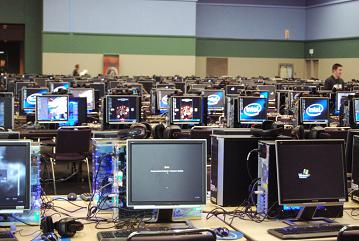 The first round of the Omegathon was held at 3 p.m., Friday, in the large PC free-play hall, which looked like a LAN party the size of a high school gymnasium. Long tables are lined with desktop computers, some heavily modded and some loaners for guests, but all running a wide assortment of games. While some players just catch up on e-mail, many others train for Counterstrike and Team Fortress 2.
The first round of the Omegathon was held at 3 p.m., Friday, in the large PC free-play hall, which looked like a LAN party the size of a high school gymnasium. Long tables are lined with desktop computers, some heavily modded and some loaners for guests, but all running a wide assortment of games. While some players just catch up on e-mail, many others train for Counterstrike and Team Fortress 2.
In one cordoned-off corner of the room, Jo and his opponents are playing Peggle, the casual Pachinko game that supposedly “requires no skill”.
This first round is more of a psychological screening trial than a competition. Omeganauts are allowed half an hour to play and replay the game until they think they have a high score, which they report to a nearby judge. It’s a simple challenge, except the players keep second-guessing their scores and starting from scratch. Some are so paralyzed by fear that they never bank their best score, leaving them with whatever score they can drum up at the deadline.
The audience for this round is purposefully slim. There are twenty screens to watch, and if any player overhears gossip about another score, it could be considered an unfair advantage. Friends and supporters are kept behind a viewing line, with some just taking the chance to stay in their hotel for an easy Friday morning.
When “Rhodysteve311” from East Providence, Rhode Island, finally reports his score and wipes his brow on the way to the sidelines, he pines for a cold drink and his girlfriend, who he was told would not be allowed into the event.
Jo seems to finish at the edge of his nerves, but the score seems fair – the last few Peggle balls bounce off some bonus-score purple pegs and into the 50,000-point funnels at the bottom of the screen. Brian turns in his score and breaks into a nervous grin.
“My hands are shaking,” he says as he catches up with Plutonium and the other players on the sideline.
The dividing line disintegrates and contest administrators, friends, and camera crews flood the Omeganaut corridor. Finally, the mob crowds around a whiteboard on the wall, and even Jerry Holkins is sneaking in to see the scores.
The first name on the list is Brian “Pikachoochoo” Jo with 497,210 points. “Hazywood” trails with 480,000, then “MNC Dover”, then “Plutonium” with 419,460.
Sixteen Omeganauts survive to the next round, and first place is enough to land Jo an interview with popular geek-blog Ars Technica.
Round Two: Boom Blox
The Omeganauts graduate to direct competition, hosted in a large projection room with folding chairs for 200. Lipske and Team Pikachoochoo nab half of the third row as spectators line up around the wall to watch a little Wii action.
The goal of Steven Spielberg’s brick-breaking opus, Boom Blox, is to throw baseballs and knock everyone else’s blocks off the table. Each game seats four players, with two moving on to the next round. This is the game that Jo discussed with his friends for hours on end in search of the perfect strategy.
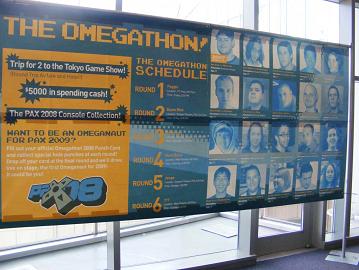 In his first of two rounds, Jo abandons his previous planning and suffers greatly for it. He strikes at two different players in a vain effort to create a weak target. His high score, however, outs him as the biggest threat, and his opponents tear his castle down over consecutive turns. On the other side of the room, Plutonium conquers Toy Block Land (and one can only assume he is hearing the lamentations of Toy Block women).
In his first of two rounds, Jo abandons his previous planning and suffers greatly for it. He strikes at two different players in a vain effort to create a weak target. His high score, however, outs him as the biggest threat, and his opponents tear his castle down over consecutive turns. On the other side of the room, Plutonium conquers Toy Block Land (and one can only assume he is hearing the lamentations of Toy Block women).
Round Two is a wild-card, one-game match between the losers of each round, and Jo makes a critical return to basics. He sits and waits, letting his turns time out while conserving ammo. Soon he has enough baseballs saved to eliminate any single opponent in one giant turn. Jo has taken control of the game, and he starts negotiating with the other players in line.
Joey Geko, a.k.a. Joseph Urbansky of Litchfield, Ohio, eventually agrees to help him annihilate the other two players, and they just barely qualify for round three.
It’s an unconventional turnaround for the plucky star, and the crowd is surprised and delighted – now Jo is signing his T-shirts and tote bags for friends from the PAX train. When cameras get up in his face, Jo’s friends line up behind him and turn their back to the cameras, so that a wall of matching “Brian Jo” shirts frame the challenger.
“I think I have to thank my coaches,” he says with a nod to the line of friends behind him.
The stories even spread beyond the competition walls. The next morning, even Penny Arcade founders Jerry Holkins and Penny Arcade artist Mike Krahulik interrupt a press conference to geek out over Jo’s technique.
“That’s amazing!” shouts Holkins. Krahulik promises to fill him in later with a surge of insider’s glee.
Round Three: Geometry Wars 2
The premise of this premiere Xbox Live Arcade title is that there are numerous glowing neon Lucky Charms marshmallows geometric shapes on the screen, and you must either shoot and avoid them, or die. It’s an old-school high score challenge like Asteroids and Robotron.
Brian Jo, uninitiated to this twitch shooter, wrings himself out of a paralyzing fear and steels himself for the challenge.
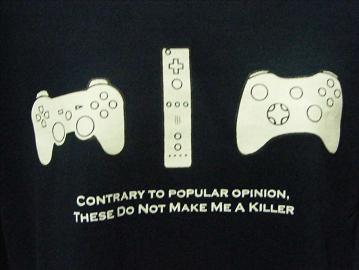 The rules allow contestants to play up to five rounds to determine first- and second-place winners. As every round counts down to start, the audience counts down with it, hundreds of voices yelling “THREE! TWO! ONE!” before the players are off.
The rules allow contestants to play up to five rounds to determine first- and second-place winners. As every round counts down to start, the audience counts down with it, hundreds of voices yelling “THREE! TWO! ONE!” before the players are off.
In his first round, Brian Jo takes first place. Luck is on his side.
Jo’s friends have taken over the second row of seats, heckling him, yelling “balls” in the middle of the round like jerks they did back home.
In his second round, Brian Jo takes first place again, leaving his two opponents even further behind. The audience roars whenever one player leaves the safety of a shield to brave the brilliant obstacle course of enemies.
When the event MC hypes up Jo’s performance, Adam Lipske in the second row yells, “Give up you’re doomed!” to some laughter, cracking Brian up in his blue bean bag.
In his third round, Brian Jo puts up a valiant fight against one opponent who just won’t let go – their scores exceed one million, then 1.2, then 1.5… and then Jo’s opponent collides with an enemy and leaves Brian in first.
One, two, three, and Jo has dominated Round Four.
In the next heat, Plutonium struggles through the first few games to hold second place, until he plays a stellar third round and blazes into first place.
Geometry Wars can be confusing, but you would never tell from the Omegathon. Like Peggle in round one, Jo devastates the competition with three straight wins.
A PAX supervisor gathers the winners for instructions on the next round, but Jo is tied up dealing with the cameras again. The contestants, too, are preoccupied as they gossip about Jo’s success. Everybody seems a little frightened of the Bay Area wonder. Even as he warns them that he sucks at the next game, they must be thinking that he’s going to devastate Round Four like every previous encounter.
Round 4: Rock Band
By its fourth round, the Omegathon has grown exponentially in size, expanding into the main stage of the Washington State Convention Center. A day earlier, the creator of Bioshock Ken Levine was giving a "Big Daddy" speech to hundreds of gamers. Tonight Brian and the Omeganauts will be the opening act for a night of concerts and celebrations. The auditorium is already about a third full, and some seating along the back of the room is filled to capacity.
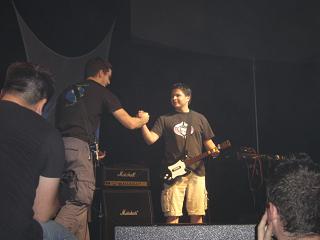 The curtains open to the blasting chords of Journey – Mike Krahulik and Jerry Holkins are kicking off the show to the tune of Rock Band 2, with the game screen projected onto two huge screens flanking the stage. It’s an audacious, slightly obnoxious show of celebrity, but it’s also a kickass reminder about how PAX celebrates the gamer.
The curtains open to the blasting chords of Journey – Mike Krahulik and Jerry Holkins are kicking off the show to the tune of Rock Band 2, with the game screen projected onto two huge screens flanking the stage. It’s an audacious, slightly obnoxious show of celebrity, but it’s also a kickass reminder about how PAX celebrates the gamer.
Maybe you haven’t seen a live Rock Band concert, but they are surprisingly awesome. The audience at a live Rock Band show swells and swoons with the drama of the game. When the players miss notes and err toward failure, the crowd rallies with cheers and cries, and when they bounce back from the brink the crowd goes wild. Oh, and when the players start to deploy Overdrive for bonus points, the audience goes fucking wild.
The self-proclaimed Sex Generals give way to the first Omeganauts and their pretend-band “Megadeth”. The song is "Eye of the Tiger" by Survivor, and everyone plays at medium difficulty. Joey Geko from the Boom Blox round is their singer and frontman. Each of the two teams were picked beforehand, one-by-one in a schoolyard-style roulette. "Megadeth" sets down "Eye of the Tiger" with a score in the ballpark of 480,000.
On a side note: “Eye of the Tiger” is a hard-ass song to sing. Seriously, Jimi Jamison sings really friggin’ high; it seems kind of mean. But I digress.
Brian Jo and Plutonium take the stage with the band “School of Hard Cocks”. [Who’s Summa Come Laude? ~Ed. Nick]. They will play the same song at the same difficulty, as per the rules of the contest. Jo takes the bass – it’s his best instrument and probably the easiest in comparison to drums, vocals, or lead guitar.
And then he loses.
"The School of Hard Cocks" limps in a slim 2,000 points short of "Megadeth", knocking all four players in "The School of Hard Cocks" out of the competition. Even so, Jo shakes hands with the winners and the competition is quickly lost in the revelry of acts like Freezepop and Jonathan Coulton of Portal fame.
The Final Rounds
The final rounds of the Omegathon were hair-raising tests of old-school dexterity, starting with traditional wooden Jenga sets. The Omeganauts had already conquered four games with shaky hands and nerves, but you could really see fingers buzzing around as they slid wooden blocks out from the Jenga tower. Players seek a little rest for their nerves between turns, leaning heavily upon a metal guard rail on the back of the stage. The audience swoons and claps respectfully after every turn, giving Jenga the same respect as a game of tennis or chess.
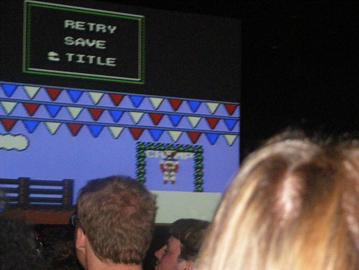 Round Six was a secret game, withheld for mystery’s sake and to prevent practice. Last year Mike and Jerry scored an early copy of Halo 3, but for 2008 they pulled the curtain aside to reveal 8-bit reds and blues. Game Six would be a rare Japanese copy of Excitebike VS, a 1988 cartridge for the original Nintendo Entertainment System never released on US shores.
Round Six was a secret game, withheld for mystery’s sake and to prevent practice. Last year Mike and Jerry scored an early copy of Halo 3, but for 2008 they pulled the curtain aside to reveal 8-bit reds and blues. Game Six would be a rare Japanese copy of Excitebike VS, a 1988 cartridge for the original Nintendo Entertainment System never released on US shores.
Joey Geko dominates the motocross antics against Seattle native Noah “Fallout” Callaway. Crashes and overheating engines leave the crowd gasping, but as Joey Geko enters the home stretch, the crowd goes wild once more.
Mike and Jerry crown Joey Geko like a champion boxer, and then they take the stage and play their own seven rounds. Sitting in beanbags, captivated by the blocky projection, I couldn’t help but catch a bit of that childish magic, as everyone got caught up watching the match.
Jo enjoys the rest of the weekend catching up with his friends, relaxing with the Omegathon pressure off his shoulders. They hardly dent this year’s Guitar Hero 3 or Halo 3 tournaments, but they ironically place third in the Rock Band tournament. Exhausted and unable to withstand another 24-hour party train, Jo flies home with his friends.
After The Show
In the days after PAX, Jo is ever calm and gracious for his chance to compete.
“Of course, just being on stage was the experience of a lifetime,” he writes.
Even with an awesome grand prize at stake, the Omegathon is unique but not the whole meaning of PAX. For every person watching Geometry Wars or Jenga, there was literally ten times as many people who just wanted to play a friendly game or learn more about the culture or the business, and many discover a new side of their favorite pastime for the first time. Even as the competitive types struggle to hang a name on some distant scoreboard, there are also new friends to make on the other side of the monitor – “gamer” or not.
